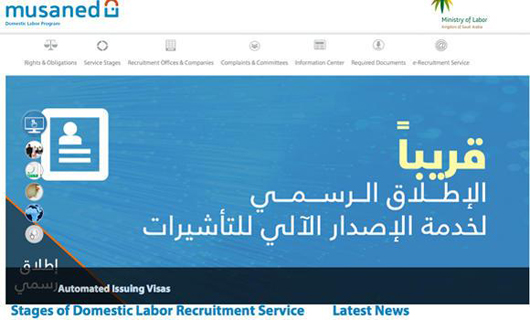Jeddah, Aug 27: An official at the Ministry of Labor confirmed that ministry will launch an e-recruitment service via the Musaned website next week. The service will allow employers to apply for visas without the need to visit labor offices.

Ahmad Al-Ghamdi, director of public relations at the Labor Ministry, said the testing of the new electronic program proved successful. The ministry is planning to transform all its services to an electronic system.
Speaking to Arab News, he said the ministry will launch this service by the next week. The recruitment process will be done within a short period in accordance to agreements with other countries which send workers to the Kingdom.
Meanwhile, Tayseer Al-Mufrej, director of the media center at the Ministry of Labor, said the ministry took the measures to improve the recruitment of domestic labor services through facilitating procedures in order to safeguard the rights of employers and workers, and to enhance the protection of the rights of all parties.
The Ministry of Labor had started giving permission to six recruitment companies to issue 1.2 million visas to hire housemaids, laborers, drivers and other workers for occupations needed in the Saudi market. These visas include the countries from which recruitment of workers is allowed and include Bangladesh, India, the Philippines, Morocco, Tanzania, Uganda, Sri Lanka, Vietnam and Mauritania.
Mohammed Aslam, a human resource director at a private company, praised efforts of Labor Ministry to improve the recruitment process which was previously taking a long time. Private companies were spending money and wasting time to recruit workers.
Adel Shuaib, another human resource official at a construction company in Jeddah said the new electronic service will facilitate recruitment of workers as there is a need to recruit them in construction projects.






Comments
This is convenient if you oown multiple websites
and blogs which can be aall managed from one account.
Conclusion- It is a good idea to manage your personal website to promote your
product but this is really not needed. It takds time, but it
is far better to aim for 100 recipients that are genuinely interested in what you hav to offer
and share your values, than to aim for 100,000 random recipients.
My web-site ... Email Spike coupon: http://ozarkcouples.com/index.php?do=/blog/78845/enjoy-cheapest-email-m…
Add new comment